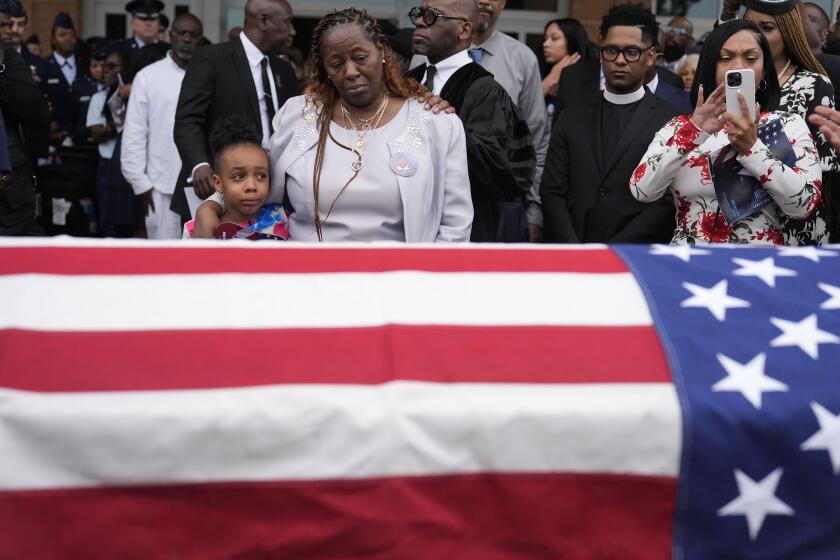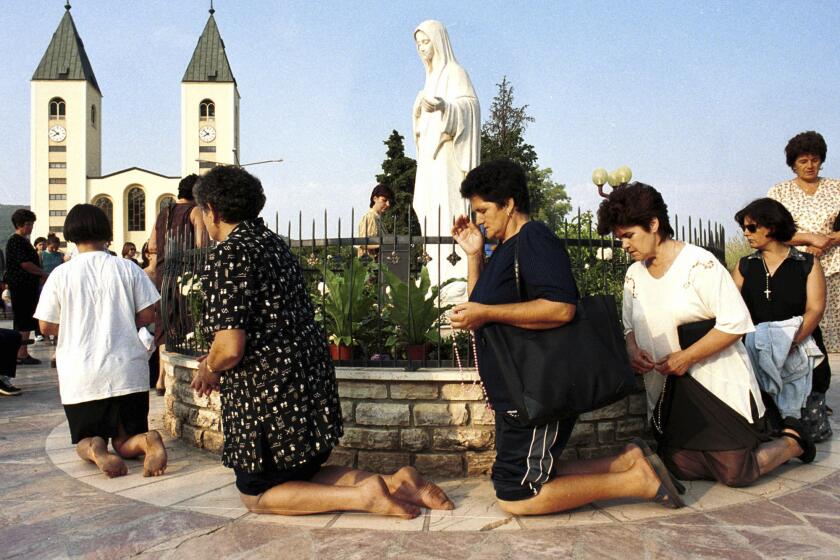U.S.-Polish Relations Start to Thaw After Stoessel Visit
After four years of glacial relations between the United States and Poland, the Soviet Union’s largest and most turbulent partner, there are signs of a spring thaw in the air.
In a gesture that has clearly pleased the Poles, a senior American statesman spent four days in Warsaw last week on an unannounced visit that included talks with the Polish leader, Gen. Wojciech Jaruzelski, and Poland’s Roman Catholic primate, Cardinal Jozef Glemp.
The visit by Walter J. Stoessel Jr., a former ambassador to Poland, the Soviet Union and West Germany who retired from his post as under secretary of state in 1982, marked the first high-level contact that the Reagan Administration has allowed itself with the Polish leadership since Jaruzelski suppressed the independent Solidarity labor union under martial law in 1981.
In addition, the International Monetary Fund is expected to accept Poland’s application for membership no later than June and possibly as early as April, opening the way for the first substantial infusion of new credit into the stagnating Polish economy since 1981.
Political Captives Freed
The United States lifted its veto on Poland’s IMF membership in December, 1984, in return for a July, 1984, amnesty that freed most Polish political prisoners. But relations quickly soured again in early 1985 over the expulsion of three American diplomats from Poland and Warsaw’s refusal to accept a new American ambassador.
Since then, officials here have voiced suspicions that Washington was delaying Poland’s IMF membership, which many see as crucial to the country’s economic recovery.
Both Polish and U.S. officials have treated Stoessel’s visit last week with great delicacy, while stressing that it was “unofficial” in nature, since Stoessel has retired from government. In private conversations, however, Polish officials have talked about it with guarded optimism, as a positive sign that the United States would like to return to the generally good relations that prevailed before 1981.
A spokesman for the U.S. Embassy, John P. Harrod, confirmed that Stoessel met with Jaruzelski and Glemp, as well as other Poles whom he declined to identify. Unofficial sources, however, said the others included at least one Solidarity activist.
Polish-U.S. Ties Discussed
The Polish government spokesman, Jerzy Urban, also confirmed the Jaruzelski meeting and said that Stoessel’s talks with Polish officials were “devoted to the full range of Polish-U.S. relations and their prospects.”
Reading a prepared statement in response to an inquiry, Urban declined to characterize the outlook for relations but spoke warmly of Stoessel, saying that “we well remember his positive contribution” to U.S.-Polish relations when he served as ambassador to Warsaw in 1968-1972.
Another Polish official, who requested anonymity, said with a smile that the visit was “not harmful” but that it dealt with “extremely complex” matters and could not be expected to produce an immediate turn in relations.
As an indication of the importance the Poles attached to Stoessel’s visit, Jaruzelski was said to have cleared “several hours” from his schedule for the meeting, the evening of March 19, although it coincided with the start of a two-day foreign ministers’ meeting of Warsaw Pact countries led by Soviet Foreign Minister Eduard A. Shevardnadze.
Unofficial Visit
A Western diplomat familiar with the talks said that while Stoessel’s visit was unofficial, he met with Administration officials in Washington before leaving and will do so on his return. The diplomat said Stoessel carried no specific message or proposals and that he was “here mainly to listen, and he did a lot of that.”
Other diplomatic sources described the session with Jaruzelski as “frank and businesslike”--terms that usually imply polite but firm disagreement on important points--but that Jaruzelski was “impressive” in putting across his views.
Over the last two years, Jaruzelski has gradually begun rebuilding relations with West European countries, partly out of an urgent need for fresh credit to revive the economy, whose output is still about 14% below its 1978 level. Poland’s Western debt has ballooned to more than $29 billion as foreign earnings have fallen and $1 billion in unpaid interest has piled up annually.
European governments, in turn, have begun to acknowledge that, in spite of the suppression of Solidarity as an organization, its underground cultural and printing activities far exceed anything else of its kind in the Communist world.
A Lively Press
And Poland, along with Hungary, remains one of the two least repressive countries in the Soviet Bloc. The official press is the liveliest in Eastern Europe, travel to the West is relatively unrestricted and small private enterprise has been allowed a significant expansion over the last three years.
In the midst of prolonged economic crisis, Jaruzelski has also sought, with disappointing results so far, to introduce market-oriented reforms and to relax the grip of central planning.
Relations with the powerful Roman Catholic Church remain tense, but apart from trying to limit its influence in the public schools, the state has made no effort to place new restrictions on the church or to hobble its massive building program of 1,000 new churches.
When Jaruzelski launched his martial-law crackdown against Solidarity in December, 1981--and described it implicitly as the only alternative to Soviet intervention--the Reagan Administration retaliated with an array of economic sanctions and a freeze on high-level political contacts.
With the gradual relaxation of political tensions in Poland and the freeing of most political prisoners, the Administration has lifted most of its economic sanctions--but stopped short of restoring Poland’s favored-nation trading status, which carries an exemption from export tariffs.
A Return to Normal
Washington has insisted that a return to normal relations must come first, signified by Poland’s acceptance of an American ambassador to replace Charge d’Affaires John R. Davis. A Polish official acknowledged in an informal conversation that Poland may have made a mistake in spurning an ambassador, but he said that since both sides have been so “burned” on this issue, it may be necessary to skirt it for some time yet.
With relations effectively frozen in 1985 and the ban on high-level contacts still in effect, U.S. officials declined to meet with Jaruzelski when he traveled to New York last September for the opening of the U.N. General Assembly. Poland was conspicuously snubbed again last November after the U.S.-Soviet summit meeting in Geneva, when ranking U.S. officials fanned out over the rest of Eastern Europe to provide briefings on the results.
In recent months, Polish Communist Party figures have put out informal feelers to the United States, suggesting that American rigidity was undermining liberals in the party leadership and strengthening the hand of a hard-line minority that favors tighter central control, harsher political discipline and closer ties with Moscow.
Among other signs of a possible thaw, a senior Polish consular official returned from Washington this week after talks that were described as amicable on bilateral issues of travel and immigration.
Discussions are also said to have been opened in Washington on constructive ways to spend millions of Polish zlotys that the U.S. government holds from food sales to Poland. One proposal under consideration is to invest them in major pollution control projects in Poland, which rates itself as one of most polluted countries in Europe.
More to Read
Start your day right
Sign up for Essential California for news, features and recommendations from the L.A. Times and beyond in your inbox six days a week.
You may occasionally receive promotional content from the Los Angeles Times.






